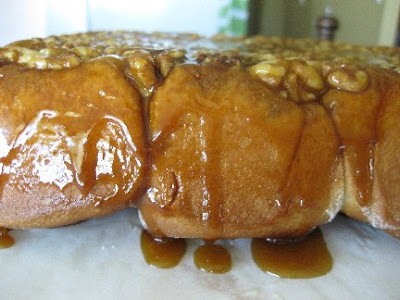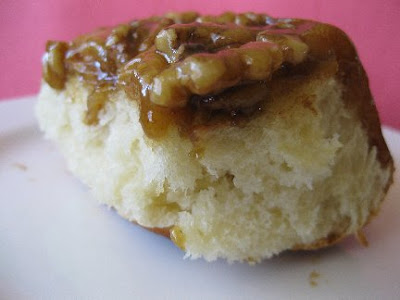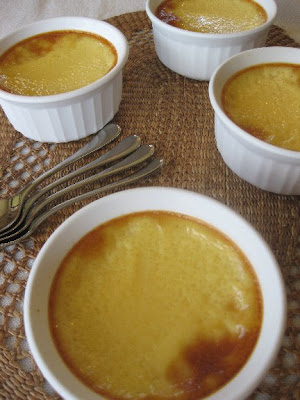The March 2009 challenge is hosted by Mary of Beans and Caviar, Melinda of Melbourne Larder and Enza of Io Da Grande. They have chosen Lasagne of Emilia-Romagna from The Splendid Table by Lynne Rossetto Kasper as the challenge.
It was definitely time consuming though so I made it 3 stages - the ragu and bechemel the day before, the pasta dough on the morning and then the rolling and assembly right before baking. And we still ended up eating quite late!
We received a pasta machine as a wedding present last year which was a huge help. I am in awe of all those who made this completely by hand!
I'm disappointed my pasta wasn't such a vivid green as I had hoped. I used a 250g box of frozen spinach but by the time I squeezed out all the water I was left with just 110g. Maybe fresh spinach would have more zing, colour-wise? Oh well. I also added an extra egg to make up the liquid and it worked perfectly.
 The finished dish - we followed the baking instructions to the letter and still got golden, crunchy bits on top (thank goodness, those are the best bits!)
The finished dish - we followed the baking instructions to the letter and still got golden, crunchy bits on top (thank goodness, those are the best bits!) This was hands down the best lasagne I had ever had. It was absolutely packed with flavour and not at all greasy. I managed to stretch the ingredients to make 2 complete dishes (although I did run out of bechemel for the second one) so we now have one waiting patiently in the freezer to enjoy once we are home with bub.
This is perfect dinner party food and we will definitely be making it again!
Thanks to our hosts for a wonderful pick this month. It's a great tie-in with the new Daring Cooks which I have registered for also.
Lasagne of Emilia-Romagna
Serves 6-8 as a main course
Spinach Egg Pasta (Pasta Verde)
2 jumbo eggs
300g fresh spinach, rinsed, dried and finely chopped or 170g frozen spinach, defrosted and squeezed dry
400g unbleached plain flour
Béchamel Sauce
60g unsalted butter
60g unbleached plain flour
570ml milk
Salt and freshly ground pepper, to taste
Freshly grated nutmeg, to taste
Ragu
3 tablespoons extra virgin olive oil
60g pancetta, finely chopped
1 medium onion, minced
1 medium stalk celery with leaves, minced
1 small carrot, minced
125g veal mince
125g pork mince
250g beef mince
30g thinly sliced Prosciutto di Parma
160ml dry red wine
375ml beef stock
500ml milk
1 tin plum tomatoes
Salt and freshly ground black pepper to taste
1 cup (or more) freshly grated Parmigano Reggiano ( I used a full 250g block!)
To make the ragu, Heat the olive oil in 30cm frying pan over medium-high heat. Add the pancetta and minced vegetables and sauté, stirring frequently with a wooden spoon, 10 minutes, or until the onions barely begin to color. Add the minces and slowly brown over medium heat. Stir often, scooping under the meats with the wooden spatula. Protect the brown glaze forming on the bottom of the pan by turning the heat down. Cook 15 minutes, or until the meats are a deep brown. Turn the contents of the skillet into a strainer and shake out the fat ( I didn't need to - there was barely any fat) then return them to the pan and set over medium heat.
Reducing and Simmering: Add the wine to the skillet, lowering the heat so the sauce bubbles quietly. Stir occasionally until the wine has reduced by half, about 3 minutes. Scrape up the brown glaze as the wine bubbles. Stir ½ cup stock into the saucepan and let it bubble slowly, 10 minutes, or until totally evaporated. Repeat with another ½ cup stock. Stir in the last 1/2 cup stock along with the milk. Adjust heat so the liquid bubbles very slowly. Partially cover the pot, and cook 1 hour. Stir frequently to check for sticking. Add the tomatoes, crushing them as they go into the pot. Cook uncovered, at a very slow bubble for another 45 minutes, or until the sauce resembles a thick, meaty stew. Season with salt and pepper.
To make the pasta, mound the flour in the center of your work area and make a well in the middle. Add the eggs and spinach, and use a wooden spoon to beat them together. Gradually start incorporating flour from the sides of the well into the liquid. Use a pastry scraper to keep the liquids from running off and to incorporate the last of the flour into the dough. It should look like a rough, messy lump. Start kneading the dough, using the scraper to scoop up any unruly pieces. Once it becomes a cohesive mass, knead for about 3 minutes. It should be elastic and a little sticky. If it is too sticky, knead in a few more tablespoons of flour. Continue kneading for about 10 minutes, or until the dough becomes smooth, satiny and very elastic. Wrap the dough in plastic wrap and let it relax at room temperature for 30 minutes – 3 hours. Cut off about a quarter of the dough, and re-wrap the rest to prevent it from drying out. Roll into a roughly long and thin rectangular shape. Set your pasta machine to its thickest setting and roll the dough through the machine. Continue rolling through each setting, cutting the dough into sections if it becomes too difficult to handle, until it becomes as thin as possible without tearing. You should be able to see your hand through the dough. Repeat with remaining dough, and either use immediately or dry at room temperature and store in a sealed container or plastic bag for 1 day.
To make the béchamel sauce, melt the butter in a medium sized saucepan over medium heat. Sift in the flour and whisk until smooth, stirring without stopping for at least one minute. Whisk in the milk a little at a time. Bring to a slow simmer, and stir for 3-4 minutes or until the sauce thickens. Season with salt, pepper and a hint of nutmeg.
To assemble the lasagne, have all ingredients on hand. Preheat the oven to 180ºC (350ºF). Layer the ingredients repeating in this order – pasta sheets, béchamel, ragu, Parmigano Reggiano, and finishing with a layer of pasta, béchamel, cheese, salt and pepper. Cover the baking dish with foil, taking care not to let it touch the top of the lasagne. Bake for 40 minutes or until almost heated through. Remove the foil and bake for another 10 minutes. When cooked, turn the oven off and let the lasagne rest inside for a further 10 minutes, then serve. This is not a solid lasagne but one that slips a bit when cut and served.





























